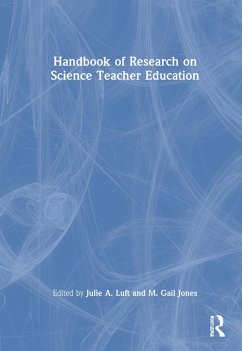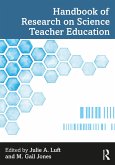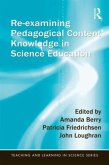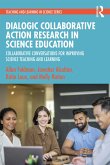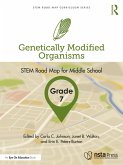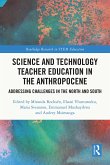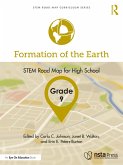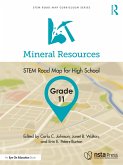Handbook of Research on Science Teacher Education
Herausgeber: Luft, Julie A.; Jones, M. Gail
Handbook of Research on Science Teacher Education
Herausgeber: Luft, Julie A.; Jones, M. Gail
- Gebundenes Buch
- Merkliste
- Auf die Merkliste
- Bewerten Bewerten
- Teilen
- Produkt teilen
- Produkterinnerung
- Produkterinnerung
This groundbreaking handbook offers a contemporary and thorough review of research relating directly to the preparation, induction, and career long professional learning of Kâ 12 science teachers.
Andere Kunden interessierten sich auch für
![Handbook of Research on Science Teacher Education Handbook of Research on Science Teacher Education]() Handbook of Research on Science Teacher Education106,99 €
Handbook of Research on Science Teacher Education106,99 €![Re-examining Pedagogical Content Knowledge in Science Education Re-examining Pedagogical Content Knowledge in Science Education]() Re-examining Pedagogical Content Knowledge in Science Education52,99 €
Re-examining Pedagogical Content Knowledge in Science Education52,99 €![Dialogic Collaborative Action Research in Science Education Dialogic Collaborative Action Research in Science Education]() Allan FeldmanDialogic Collaborative Action Research in Science Education60,99 €
Allan FeldmanDialogic Collaborative Action Research in Science Education60,99 €![Genetically Modified Organisms, Grade 7 Genetically Modified Organisms, Grade 7]() Genetically Modified Organisms, Grade 738,99 €
Genetically Modified Organisms, Grade 738,99 €![Science and Technology Teacher Education in the Anthropocene Science and Technology Teacher Education in the Anthropocene]() Science and Technology Teacher Education in the Anthropocene142,99 €
Science and Technology Teacher Education in the Anthropocene142,99 €![Formation of the Earth, Grade 9 Formation of the Earth, Grade 9]() Formation of the Earth, Grade 938,99 €
Formation of the Earth, Grade 938,99 €![Mineral Resources, Grade 11 Mineral Resources, Grade 11]() Mineral Resources, Grade 1138,99 €
Mineral Resources, Grade 1138,99 €-
-
-
This groundbreaking handbook offers a contemporary and thorough review of research relating directly to the preparation, induction, and career long professional learning of Kâ 12 science teachers.
Hinweis: Dieser Artikel kann nur an eine deutsche Lieferadresse ausgeliefert werden.
Hinweis: Dieser Artikel kann nur an eine deutsche Lieferadresse ausgeliefert werden.
Produktdetails
- Produktdetails
- Verlag: Taylor & Francis Ltd
- Seitenzahl: 534
- Erscheinungstermin: 6. Mai 2022
- Englisch
- Abmessung: 260mm x 183mm x 33mm
- Gewicht: 1086g
- ISBN-13: 9780367565831
- ISBN-10: 0367565838
- Artikelnr.: 62884021
- Herstellerkennzeichnung
- Libri GmbH
- Europaallee 1
- 36244 Bad Hersfeld
- gpsr@libri.de
- Verlag: Taylor & Francis Ltd
- Seitenzahl: 534
- Erscheinungstermin: 6. Mai 2022
- Englisch
- Abmessung: 260mm x 183mm x 33mm
- Gewicht: 1086g
- ISBN-13: 9780367565831
- ISBN-10: 0367565838
- Artikelnr.: 62884021
- Herstellerkennzeichnung
- Libri GmbH
- Europaallee 1
- 36244 Bad Hersfeld
- gpsr@libri.de
Julie A. Luft is Distinguished Research Professor, Athletic Association Professor of Mathematics and Science Education, and Adjunct Professor of Biochemistry and Molecular Biology at the University of Georgia, USA. M. Gail Jones is Alumni Distinguished Graduate Professor of Science Education and Senior Research Fellow at the Friday Institute for Educational Innovation at North Carolina State University, USA.
Section 1: Engaging in Science Teacher Education Research
Section Editor: Julie A. Luft
1. The Importance of Research in Science Teacher Education
Sibel Erduran and Liam Guilfoyle
2. The Contribution of Large Educational Surveys to Science Teacher
Education Research
Robert H. Tai, Joseph Taylor, Vijay Reddy, and Eric R. Banilower
3. Qualitatively Conducting Teacher Education Research
Felicia Moore Mensah and Jessica L. Chen
4. Mixed Methods Research on Science Teacher Education
Gayle A. Buck and Francesca A. Williamson
5. Towards Justice: Designing for a Rightful Presence as a Lens for
Science Teacher Education Research
Angela Calabrese-Barton, Edna Tan, Kathleen Schenkel, and Aerin
Benavides
Section 2: Initial Science Teacher Education - Core Areas
Section Editor: Sarah Carrier
6. Preparing Early Childhood Teachers to Support Young Children's
Equitable Science Sensemaking
Carla Zembal-Saul, Christina Siry, Sabela F. Monteira, and Frances
Nebus Bose
7. Well-Started Beginners: Preparing Elementary Teachers for Rigorous,
Consequential, Just, and Equitable Science Teaching
Elizabeth A. Davis and Christa Haverly
8. Research on Secondary Science Teacher Preparation
Todd Campbell, Ron Gray, Xavier Fazio, and Jan van Driel
9. Understanding the Role of Field Experiences in Preservice Science
Teacher Preparation
David Stroupe
10. Recent Trends in Science Education Research on Mentoring Pre-Service
Teachers
Leslie U. Bradbury
11. Alternative Pathways to Science Teaching: Approaches and Impacts
Elizabeth Edmondson, Alison Dossick, Smadar Donitsa-Schmidt, Yehudit
Judy Dori,
Christine Ure, and Christel Balck
Section 3: Initial Teacher Preparation - Situated Aspects
Section Editor: David F. Jackson
12. Preservice Science Teacher Education Around the Globe: Trends,
Challenges, and Future Directions
Hernán Cofré, Claudia Vergara, David Santibáñez, and José Pavez
13. Partnerships in K-12 Preservice Science Teacher Education
Andrew Gilbert and Linda Hobbs
14. The Magic of Informal Settings: A Literature Review of Partnerships
and Collaborations that Support Preservice Science Teacher Education
Across the Globe
Natasha Cooke-Nieves, Jamie Wallace, Preeti Gupta, and Elaine Howes
15. Discursive Practices in Initial Science Teacher Education
Mercè Izquierdo, Ainoa Marzábal, Cristian Merino, Valeria Cabello,
Patricia Moreira, Luigi Cuellar, Virginia Delgado, Franklin Manrique,
and Macarena Soto
16. The Role of Emerging Technologies in Science Teacher Preparation
Gina Childers and Rebecca Hite
17. Policy in K-12 Science Teacher Preparation: Uniformity and Diversity
from International Perspectives
Cheng Liu, Wenyuan Yang, and Enshan Liu
Section 4: Science Teacher Continuing Professional Development
Section Editor: Lauren Madden
18. The Learning Opportunities of Newly Hired Teachers of Science
Shannon L. Navy, Julie A. Luft, and Audrey Msimanga
19. Science Teacher Leadership: The Current Landscape and Paths Forward
Brooke A. Whitworth, Julianne A. Wenner, and Dorit Tubin
20. Professional Development of Science Teachers for Inquiry Instruction
Umesh Ramnarain, Daniel Capps, and Ying-Shao Hsu
21. A Literature Review of Global Perspectives on the Professional
Development of Culturally Responsive Science Teachers
Julie C. Brown, Rose M. Cringle, and Nihat Kotluk
22. Professional Learning Communities Across Science Teachers' Careers:
The Importance of Differentiating Learning
Ron Blonder and Vicki Vescio
23. Digital Technologies and Professional Learning of Science Teachers: A
Technological Pedagogical Content Knowledge (TPACK) Perspective
Seng Chee Tan, Tang Wee Teo, and Chin-Chung Tsai
Section 5: Science Teacher Education -Central Tenets
Section Editor: Soonhye Park
24. Science Teacher Professional Knowledge and Its Relationship to
High-Quality Science Instruction
Vanessa Kind, Soonhye Park, and Kennedy Kam Ho Chan
25. Indigenous Knowledge in Science Education: Implications for Teacher
Education
Josef de Beer, Neal Petersen, and Meshach Ogunniyi
26. Action research: A Promising Strategy for Science Teacher Education
Allan Feldman, Nadja Belova, Ingo Eilks, Marika Kapanadze, Rachel
Mamlok-Naaman,
Franz Rauch, and Mehmet Fatih Täar
27. Including All Learners through Science Teacher Education
Michele Hollingsworth Koomen, Sami Kahn, and Teresa Shume
28. The Role of Teacher Education in Teaching Science to Emergent
Bilingual Learners
Edward G. Lyon and Sara Tolbert
29. Educative Curriculum Materials and Their Role in the Learning of
Science Teachers
Melina Furman, Mariana Luzuriaga, Margarita Gomez, and Mauricio Duque
Section 6: Science Teacher Education - Emerging Areas
Section Editor: Rachel Mamlok-Naaman
30. Learning to Teach Controversial Topics
Michael J. Reiss
31. Professional Identity as a Framework for Science Teacher Education
and Professional Development
Dana Vedder-Weiss
32. Emotion and Science Teacher Education
Alberto Bellocchi and Arnau Amat
33. Learning to Teach Science from a Contextualized Stance
Michael Giamellaro, Kassandra L'Heureux, Cory Buxton, Marie-Claude
Beaudry,
Jean-Philippe Ayotte-Beaudet, and Talal Alajmi
34. Learning in and Through Researcher-Teacher Collaboration
Carrie D. Allen, Sara C. Heredia, Eve Manz, and William (Bill) Penuel
35. Integrated STEM Teacher Education: An Opportunity for Promoting
Equity
Erin E. Peters-Burton and Kelly L. Knight
Section Editor: Julie A. Luft
1. The Importance of Research in Science Teacher Education
Sibel Erduran and Liam Guilfoyle
2. The Contribution of Large Educational Surveys to Science Teacher
Education Research
Robert H. Tai, Joseph Taylor, Vijay Reddy, and Eric R. Banilower
3. Qualitatively Conducting Teacher Education Research
Felicia Moore Mensah and Jessica L. Chen
4. Mixed Methods Research on Science Teacher Education
Gayle A. Buck and Francesca A. Williamson
5. Towards Justice: Designing for a Rightful Presence as a Lens for
Science Teacher Education Research
Angela Calabrese-Barton, Edna Tan, Kathleen Schenkel, and Aerin
Benavides
Section 2: Initial Science Teacher Education - Core Areas
Section Editor: Sarah Carrier
6. Preparing Early Childhood Teachers to Support Young Children's
Equitable Science Sensemaking
Carla Zembal-Saul, Christina Siry, Sabela F. Monteira, and Frances
Nebus Bose
7. Well-Started Beginners: Preparing Elementary Teachers for Rigorous,
Consequential, Just, and Equitable Science Teaching
Elizabeth A. Davis and Christa Haverly
8. Research on Secondary Science Teacher Preparation
Todd Campbell, Ron Gray, Xavier Fazio, and Jan van Driel
9. Understanding the Role of Field Experiences in Preservice Science
Teacher Preparation
David Stroupe
10. Recent Trends in Science Education Research on Mentoring Pre-Service
Teachers
Leslie U. Bradbury
11. Alternative Pathways to Science Teaching: Approaches and Impacts
Elizabeth Edmondson, Alison Dossick, Smadar Donitsa-Schmidt, Yehudit
Judy Dori,
Christine Ure, and Christel Balck
Section 3: Initial Teacher Preparation - Situated Aspects
Section Editor: David F. Jackson
12. Preservice Science Teacher Education Around the Globe: Trends,
Challenges, and Future Directions
Hernán Cofré, Claudia Vergara, David Santibáñez, and José Pavez
13. Partnerships in K-12 Preservice Science Teacher Education
Andrew Gilbert and Linda Hobbs
14. The Magic of Informal Settings: A Literature Review of Partnerships
and Collaborations that Support Preservice Science Teacher Education
Across the Globe
Natasha Cooke-Nieves, Jamie Wallace, Preeti Gupta, and Elaine Howes
15. Discursive Practices in Initial Science Teacher Education
Mercè Izquierdo, Ainoa Marzábal, Cristian Merino, Valeria Cabello,
Patricia Moreira, Luigi Cuellar, Virginia Delgado, Franklin Manrique,
and Macarena Soto
16. The Role of Emerging Technologies in Science Teacher Preparation
Gina Childers and Rebecca Hite
17. Policy in K-12 Science Teacher Preparation: Uniformity and Diversity
from International Perspectives
Cheng Liu, Wenyuan Yang, and Enshan Liu
Section 4: Science Teacher Continuing Professional Development
Section Editor: Lauren Madden
18. The Learning Opportunities of Newly Hired Teachers of Science
Shannon L. Navy, Julie A. Luft, and Audrey Msimanga
19. Science Teacher Leadership: The Current Landscape and Paths Forward
Brooke A. Whitworth, Julianne A. Wenner, and Dorit Tubin
20. Professional Development of Science Teachers for Inquiry Instruction
Umesh Ramnarain, Daniel Capps, and Ying-Shao Hsu
21. A Literature Review of Global Perspectives on the Professional
Development of Culturally Responsive Science Teachers
Julie C. Brown, Rose M. Cringle, and Nihat Kotluk
22. Professional Learning Communities Across Science Teachers' Careers:
The Importance of Differentiating Learning
Ron Blonder and Vicki Vescio
23. Digital Technologies and Professional Learning of Science Teachers: A
Technological Pedagogical Content Knowledge (TPACK) Perspective
Seng Chee Tan, Tang Wee Teo, and Chin-Chung Tsai
Section 5: Science Teacher Education -Central Tenets
Section Editor: Soonhye Park
24. Science Teacher Professional Knowledge and Its Relationship to
High-Quality Science Instruction
Vanessa Kind, Soonhye Park, and Kennedy Kam Ho Chan
25. Indigenous Knowledge in Science Education: Implications for Teacher
Education
Josef de Beer, Neal Petersen, and Meshach Ogunniyi
26. Action research: A Promising Strategy for Science Teacher Education
Allan Feldman, Nadja Belova, Ingo Eilks, Marika Kapanadze, Rachel
Mamlok-Naaman,
Franz Rauch, and Mehmet Fatih Täar
27. Including All Learners through Science Teacher Education
Michele Hollingsworth Koomen, Sami Kahn, and Teresa Shume
28. The Role of Teacher Education in Teaching Science to Emergent
Bilingual Learners
Edward G. Lyon and Sara Tolbert
29. Educative Curriculum Materials and Their Role in the Learning of
Science Teachers
Melina Furman, Mariana Luzuriaga, Margarita Gomez, and Mauricio Duque
Section 6: Science Teacher Education - Emerging Areas
Section Editor: Rachel Mamlok-Naaman
30. Learning to Teach Controversial Topics
Michael J. Reiss
31. Professional Identity as a Framework for Science Teacher Education
and Professional Development
Dana Vedder-Weiss
32. Emotion and Science Teacher Education
Alberto Bellocchi and Arnau Amat
33. Learning to Teach Science from a Contextualized Stance
Michael Giamellaro, Kassandra L'Heureux, Cory Buxton, Marie-Claude
Beaudry,
Jean-Philippe Ayotte-Beaudet, and Talal Alajmi
34. Learning in and Through Researcher-Teacher Collaboration
Carrie D. Allen, Sara C. Heredia, Eve Manz, and William (Bill) Penuel
35. Integrated STEM Teacher Education: An Opportunity for Promoting
Equity
Erin E. Peters-Burton and Kelly L. Knight
Section 1: Engaging in Science Teacher Education Research
Section Editor: Julie A. Luft
1. The Importance of Research in Science Teacher Education
Sibel Erduran and Liam Guilfoyle
2. The Contribution of Large Educational Surveys to Science Teacher
Education Research
Robert H. Tai, Joseph Taylor, Vijay Reddy, and Eric R. Banilower
3. Qualitatively Conducting Teacher Education Research
Felicia Moore Mensah and Jessica L. Chen
4. Mixed Methods Research on Science Teacher Education
Gayle A. Buck and Francesca A. Williamson
5. Towards Justice: Designing for a Rightful Presence as a Lens for
Science Teacher Education Research
Angela Calabrese-Barton, Edna Tan, Kathleen Schenkel, and Aerin
Benavides
Section 2: Initial Science Teacher Education - Core Areas
Section Editor: Sarah Carrier
6. Preparing Early Childhood Teachers to Support Young Children's
Equitable Science Sensemaking
Carla Zembal-Saul, Christina Siry, Sabela F. Monteira, and Frances
Nebus Bose
7. Well-Started Beginners: Preparing Elementary Teachers for Rigorous,
Consequential, Just, and Equitable Science Teaching
Elizabeth A. Davis and Christa Haverly
8. Research on Secondary Science Teacher Preparation
Todd Campbell, Ron Gray, Xavier Fazio, and Jan van Driel
9. Understanding the Role of Field Experiences in Preservice Science
Teacher Preparation
David Stroupe
10. Recent Trends in Science Education Research on Mentoring Pre-Service
Teachers
Leslie U. Bradbury
11. Alternative Pathways to Science Teaching: Approaches and Impacts
Elizabeth Edmondson, Alison Dossick, Smadar Donitsa-Schmidt, Yehudit
Judy Dori,
Christine Ure, and Christel Balck
Section 3: Initial Teacher Preparation - Situated Aspects
Section Editor: David F. Jackson
12. Preservice Science Teacher Education Around the Globe: Trends,
Challenges, and Future Directions
Hernán Cofré, Claudia Vergara, David Santibáñez, and José Pavez
13. Partnerships in K-12 Preservice Science Teacher Education
Andrew Gilbert and Linda Hobbs
14. The Magic of Informal Settings: A Literature Review of Partnerships
and Collaborations that Support Preservice Science Teacher Education
Across the Globe
Natasha Cooke-Nieves, Jamie Wallace, Preeti Gupta, and Elaine Howes
15. Discursive Practices in Initial Science Teacher Education
Mercè Izquierdo, Ainoa Marzábal, Cristian Merino, Valeria Cabello,
Patricia Moreira, Luigi Cuellar, Virginia Delgado, Franklin Manrique,
and Macarena Soto
16. The Role of Emerging Technologies in Science Teacher Preparation
Gina Childers and Rebecca Hite
17. Policy in K-12 Science Teacher Preparation: Uniformity and Diversity
from International Perspectives
Cheng Liu, Wenyuan Yang, and Enshan Liu
Section 4: Science Teacher Continuing Professional Development
Section Editor: Lauren Madden
18. The Learning Opportunities of Newly Hired Teachers of Science
Shannon L. Navy, Julie A. Luft, and Audrey Msimanga
19. Science Teacher Leadership: The Current Landscape and Paths Forward
Brooke A. Whitworth, Julianne A. Wenner, and Dorit Tubin
20. Professional Development of Science Teachers for Inquiry Instruction
Umesh Ramnarain, Daniel Capps, and Ying-Shao Hsu
21. A Literature Review of Global Perspectives on the Professional
Development of Culturally Responsive Science Teachers
Julie C. Brown, Rose M. Cringle, and Nihat Kotluk
22. Professional Learning Communities Across Science Teachers' Careers:
The Importance of Differentiating Learning
Ron Blonder and Vicki Vescio
23. Digital Technologies and Professional Learning of Science Teachers: A
Technological Pedagogical Content Knowledge (TPACK) Perspective
Seng Chee Tan, Tang Wee Teo, and Chin-Chung Tsai
Section 5: Science Teacher Education -Central Tenets
Section Editor: Soonhye Park
24. Science Teacher Professional Knowledge and Its Relationship to
High-Quality Science Instruction
Vanessa Kind, Soonhye Park, and Kennedy Kam Ho Chan
25. Indigenous Knowledge in Science Education: Implications for Teacher
Education
Josef de Beer, Neal Petersen, and Meshach Ogunniyi
26. Action research: A Promising Strategy for Science Teacher Education
Allan Feldman, Nadja Belova, Ingo Eilks, Marika Kapanadze, Rachel
Mamlok-Naaman,
Franz Rauch, and Mehmet Fatih Täar
27. Including All Learners through Science Teacher Education
Michele Hollingsworth Koomen, Sami Kahn, and Teresa Shume
28. The Role of Teacher Education in Teaching Science to Emergent
Bilingual Learners
Edward G. Lyon and Sara Tolbert
29. Educative Curriculum Materials and Their Role in the Learning of
Science Teachers
Melina Furman, Mariana Luzuriaga, Margarita Gomez, and Mauricio Duque
Section 6: Science Teacher Education - Emerging Areas
Section Editor: Rachel Mamlok-Naaman
30. Learning to Teach Controversial Topics
Michael J. Reiss
31. Professional Identity as a Framework for Science Teacher Education
and Professional Development
Dana Vedder-Weiss
32. Emotion and Science Teacher Education
Alberto Bellocchi and Arnau Amat
33. Learning to Teach Science from a Contextualized Stance
Michael Giamellaro, Kassandra L'Heureux, Cory Buxton, Marie-Claude
Beaudry,
Jean-Philippe Ayotte-Beaudet, and Talal Alajmi
34. Learning in and Through Researcher-Teacher Collaboration
Carrie D. Allen, Sara C. Heredia, Eve Manz, and William (Bill) Penuel
35. Integrated STEM Teacher Education: An Opportunity for Promoting
Equity
Erin E. Peters-Burton and Kelly L. Knight
Section Editor: Julie A. Luft
1. The Importance of Research in Science Teacher Education
Sibel Erduran and Liam Guilfoyle
2. The Contribution of Large Educational Surveys to Science Teacher
Education Research
Robert H. Tai, Joseph Taylor, Vijay Reddy, and Eric R. Banilower
3. Qualitatively Conducting Teacher Education Research
Felicia Moore Mensah and Jessica L. Chen
4. Mixed Methods Research on Science Teacher Education
Gayle A. Buck and Francesca A. Williamson
5. Towards Justice: Designing for a Rightful Presence as a Lens for
Science Teacher Education Research
Angela Calabrese-Barton, Edna Tan, Kathleen Schenkel, and Aerin
Benavides
Section 2: Initial Science Teacher Education - Core Areas
Section Editor: Sarah Carrier
6. Preparing Early Childhood Teachers to Support Young Children's
Equitable Science Sensemaking
Carla Zembal-Saul, Christina Siry, Sabela F. Monteira, and Frances
Nebus Bose
7. Well-Started Beginners: Preparing Elementary Teachers for Rigorous,
Consequential, Just, and Equitable Science Teaching
Elizabeth A. Davis and Christa Haverly
8. Research on Secondary Science Teacher Preparation
Todd Campbell, Ron Gray, Xavier Fazio, and Jan van Driel
9. Understanding the Role of Field Experiences in Preservice Science
Teacher Preparation
David Stroupe
10. Recent Trends in Science Education Research on Mentoring Pre-Service
Teachers
Leslie U. Bradbury
11. Alternative Pathways to Science Teaching: Approaches and Impacts
Elizabeth Edmondson, Alison Dossick, Smadar Donitsa-Schmidt, Yehudit
Judy Dori,
Christine Ure, and Christel Balck
Section 3: Initial Teacher Preparation - Situated Aspects
Section Editor: David F. Jackson
12. Preservice Science Teacher Education Around the Globe: Trends,
Challenges, and Future Directions
Hernán Cofré, Claudia Vergara, David Santibáñez, and José Pavez
13. Partnerships in K-12 Preservice Science Teacher Education
Andrew Gilbert and Linda Hobbs
14. The Magic of Informal Settings: A Literature Review of Partnerships
and Collaborations that Support Preservice Science Teacher Education
Across the Globe
Natasha Cooke-Nieves, Jamie Wallace, Preeti Gupta, and Elaine Howes
15. Discursive Practices in Initial Science Teacher Education
Mercè Izquierdo, Ainoa Marzábal, Cristian Merino, Valeria Cabello,
Patricia Moreira, Luigi Cuellar, Virginia Delgado, Franklin Manrique,
and Macarena Soto
16. The Role of Emerging Technologies in Science Teacher Preparation
Gina Childers and Rebecca Hite
17. Policy in K-12 Science Teacher Preparation: Uniformity and Diversity
from International Perspectives
Cheng Liu, Wenyuan Yang, and Enshan Liu
Section 4: Science Teacher Continuing Professional Development
Section Editor: Lauren Madden
18. The Learning Opportunities of Newly Hired Teachers of Science
Shannon L. Navy, Julie A. Luft, and Audrey Msimanga
19. Science Teacher Leadership: The Current Landscape and Paths Forward
Brooke A. Whitworth, Julianne A. Wenner, and Dorit Tubin
20. Professional Development of Science Teachers for Inquiry Instruction
Umesh Ramnarain, Daniel Capps, and Ying-Shao Hsu
21. A Literature Review of Global Perspectives on the Professional
Development of Culturally Responsive Science Teachers
Julie C. Brown, Rose M. Cringle, and Nihat Kotluk
22. Professional Learning Communities Across Science Teachers' Careers:
The Importance of Differentiating Learning
Ron Blonder and Vicki Vescio
23. Digital Technologies and Professional Learning of Science Teachers: A
Technological Pedagogical Content Knowledge (TPACK) Perspective
Seng Chee Tan, Tang Wee Teo, and Chin-Chung Tsai
Section 5: Science Teacher Education -Central Tenets
Section Editor: Soonhye Park
24. Science Teacher Professional Knowledge and Its Relationship to
High-Quality Science Instruction
Vanessa Kind, Soonhye Park, and Kennedy Kam Ho Chan
25. Indigenous Knowledge in Science Education: Implications for Teacher
Education
Josef de Beer, Neal Petersen, and Meshach Ogunniyi
26. Action research: A Promising Strategy for Science Teacher Education
Allan Feldman, Nadja Belova, Ingo Eilks, Marika Kapanadze, Rachel
Mamlok-Naaman,
Franz Rauch, and Mehmet Fatih Täar
27. Including All Learners through Science Teacher Education
Michele Hollingsworth Koomen, Sami Kahn, and Teresa Shume
28. The Role of Teacher Education in Teaching Science to Emergent
Bilingual Learners
Edward G. Lyon and Sara Tolbert
29. Educative Curriculum Materials and Their Role in the Learning of
Science Teachers
Melina Furman, Mariana Luzuriaga, Margarita Gomez, and Mauricio Duque
Section 6: Science Teacher Education - Emerging Areas
Section Editor: Rachel Mamlok-Naaman
30. Learning to Teach Controversial Topics
Michael J. Reiss
31. Professional Identity as a Framework for Science Teacher Education
and Professional Development
Dana Vedder-Weiss
32. Emotion and Science Teacher Education
Alberto Bellocchi and Arnau Amat
33. Learning to Teach Science from a Contextualized Stance
Michael Giamellaro, Kassandra L'Heureux, Cory Buxton, Marie-Claude
Beaudry,
Jean-Philippe Ayotte-Beaudet, and Talal Alajmi
34. Learning in and Through Researcher-Teacher Collaboration
Carrie D. Allen, Sara C. Heredia, Eve Manz, and William (Bill) Penuel
35. Integrated STEM Teacher Education: An Opportunity for Promoting
Equity
Erin E. Peters-Burton and Kelly L. Knight

